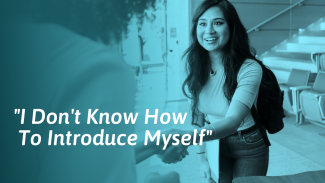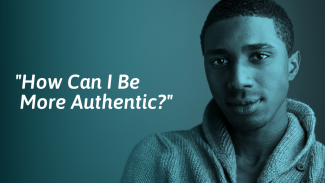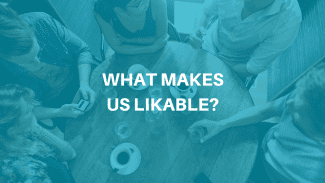Standing out from the crowd is not in our nature.
As human beings, our brains are wired to produce feelings of pleasure when we experience social acceptance (i.e. “fitting in”). According to Dr. Susan Whitbourne of Psychology Today 1, “The reward centers in the brain become activated when we’re influenced by others to conform… Once exposed to [social norms], they become so integrated into your own memories that you forget having held disparate opinions.”
In other words, it can actually be difficult to find positive ways to stand out from the crowd because it is in our nature to “go with the flow,” or look, speak, and behave like the people around us.
However, there are benefits to standing out. Says Dr. Nathaniel Lambert, “I do believe that there are many instances in which being different can help. Having a noticeable difference can actually get you the job or the position that you are seeking. . . Some of the people we interviewed suggested that standing out gave them more positive attention, a chance to be a positive example, and more opportunities in general.”2
Networking, or meeting and talking with new people for the purpose of career-related acquaintances and connections, is one example of a time when “standing out from the crowd” is very beneficial. Attempting to make new friends, increase popularity, get recruited for a sorority or fraternity, or garner votes for a specific cause are other times when “fitting in” will not serve your purposes.
So how do you get noticed in social situations like these? The key is to make yourself memorable.
Memorable Mingling
One sure-fire way to make sure you don’t get noticed is to stay and talk with the same group of people for the duration of the event. Mingling, or making your way through the crowd and introducing yourself to many new people, is the first and most important step to standing out in any social situation. To get noticed, you have to be seen. It doesn’t matter what else you are prepared to say or do in order to stand out if nobody sees you.
For effective mingling, you must be willing to approach and introduce yourself to groups of people. This takes confidence and the ability to make conversation once you’re finished with introductions. One example of an introductory conversation is:
*Approach group of people*
You: “Hey guys, my name is Amanda. I’m new to the company so I just wanted to take a second to introduce myself and let you guys know that I’m excited to be here and work with you all.”
Group: “Oh hey Amanda, I’m Greg, nice to meet you! We’re excited to have you on board!”
You: “Thank you! So how long have you all been working here?”
And the dialogue will continue. When the conversation naturally dies down, take the opportunity to move on to another group. End by telling everyone it was nice to meet them and you look forward to seeing them again soon. Remember, the more people you are able to meet, the more attention you will get at your social gathering.
Memorable Conversation
Another way to get noticed in social situations, whether it’s a party, in class or in the workplace, is to make memorable conversation. One fool-proof way to be memorable is by making your audience laugh. When having your introductory conversation (outlined above), taking advantage of natural opportunities to inject humor will make sure you stand out to the people around you. You might even like to learn some tips on being funny.
In addition to evoking laughter, sharing something interesting or memorable about yourself will also help you to get noticed. When mingling at social gatherings for the purpose of standing out, don’t dump your entire life story on the people you meet. Instead, come prepared with one or two interesting facts or anecdotes and use them in your conversations.
Rare or unique life experiences or trips, special hobbies, interesting projects, or successful job accomplishments are great for memorable “about me” talking points. However, be sure not to come across as bragging, which will prompt instant dislike and cause you to stand out in a negative way. To avoid the appearance of boasting when sharing your memorable facts, wait for an opportunity to arise naturally instead of forcing your accomplishments into the conversation at random.
What Not to Do
Greg: *finishes a fascinating golf story about hitting three birdies in a row*
You: “Oh cool, I won gold in Olympic basket weaving five years straight before becoming a professional water poloist.”
Everyone Else: *Awkward silence*
What to Do Instead
Greg: *finishes a story about a work project that garnered the attention of the CEO*
You: “Wow, that’s really impressive! I did a similar project at the last company I worked for, and it ended up becoming the basis of the company’s advertising campaign that year. What other types of projects do you do here?”
In this scenario, you are sharing your own memorable fact without brushing off or one-upping Greg’s accomplishment. You are also avoiding turning the spotlight on yourself by returning the conversation to Greg with a follow-up question about his story. You shared a memorable fact about yourself at a natural point in the conversation, and more than likely the group will later ask you more questions about your project, allowing you more room to share your accomplishments without the appearance of showing off.
Mingling confidently with new people, using humor in your conversations, and sharing memorable facts about yourself will undoubtedly help you to stand out from your peers at your social gathering. Because blending in with the crowd comes more naturally to most of us than standing out, make sure you have a game plan before you attend the event. Let your confidence shine and get ready to get noticed!
What are some situations you’ve experienced that required you to stand out from the crowd? What strategies worked best for you? Share your stories below!









